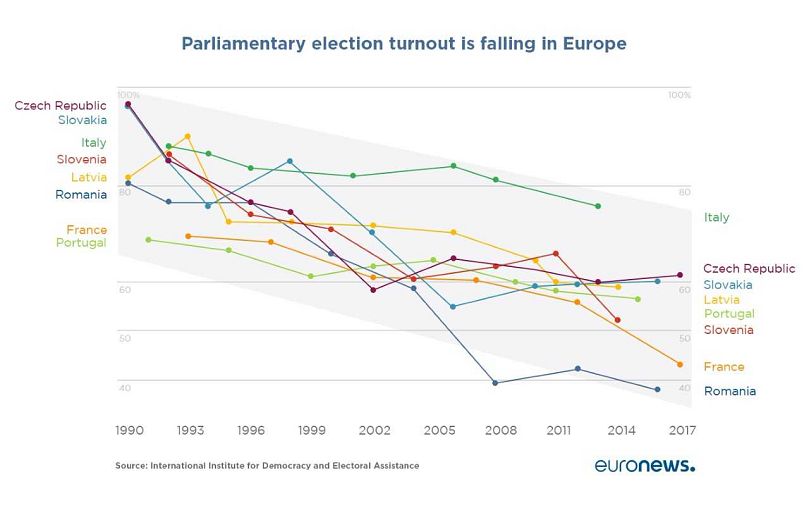The global risk consultancy says confidence in the political establishment and voter turnout have declined steeply. But it forecasts an encouraging year for the Eurozone.
Sharply falling trust in the political process across the developed world, including in Europe, is eroding the legitimacy of traditional institutions. That’s one of the main conclusions of the world’s largest political risk consultancy in its assessment of the global outlook for 2018.
The Eurasia Group, which employs a network of analysts around the world, says in its Top Risks 2018 report that “the global order is unraveling” and the new year is ripe for “a big unexpected crisis – the geopolitical equivalent of the 2008 financial meltdown”.
“Liberal democracies have less legitimacy than at any time since World War II, and most of their structural problems don’t appear fixable,” it adds.
Protest rising, turnout falling
Unsurprisingly, there is much comment on the Trump presidency and the political atmosphere in the US, where the report says public distrust of the media feeds conspiracy theories and political movements previously deemed unacceptable. But it also finds echoes in Europe, where lower turnout in elections also “demonstrates growing public apathy”, and protest votes are becoming more common.
The graph illustrates vividly how parliamentary election turnout is falling in Europe. Figures that regularly hit 70-80 percent in the 1990s have in recent years straddled the 60 percent mark, sometimes falling well below.
Romania sits at the bottom of the table, with electoral turnouts hovering around 40 percent in recent years and falling below this mark in December 2016 after several years of civil unrest and political scandals.
Last year’s French parliamentary elections also stand out. A turnout of under 43 percent across two rounds came in the wake of Emmanuel Macron’s presidential victory. Voter fatigue may explain the lack of enthusiasm in part – people were called to polling stations four times in under two months – but the figures also reflect a collapse in support for the traditional centre-right and centre-left parties. The elections put the new president’s Republic on the Move (REM) party firmly in control but Macron remains unpopular – his approval rating was just 32 percent in early November, according to a YouGov poll.
Institutions less legitimate
The “broad erosion of political institutions” and “rise of populism” isn’t yet having an impact on policymaking, the Eurasia Group’s study says. “But the expansion of an increasingly toxic antiestablishment sentiment is starting to erode the legitimacy of political institutions in established democracies.”
This ties in with the conclusions of Tony Blair’s institute published last week. The report by the former British prime minister’s Institute for Global Change argues that populism is set to gain strength in Europe and has “taken over the levers of government” across a swathe of Central and Eastern Europe.
In countries where institutions are most badly damaged and least resilient, the Eurasia Group says the result is often instability, or – citing Turkey – authoritarian rule. Weakened institutions can hit investment and heighten unpredictability in policy-making, whereas strong courts and media act as “guardrails” against powerful individuals.
Europe: not a Top Ten risk
There are grounds for optimism for Europe’s establishment however, in the Eurasia Group report. Germany and the rest of the EU are forecast to remain stable despite the threatening global risks - although Brexit is predicted to play a part in making the UK's troubles worse.
In its annual section marked “Red Herrings” – areas of concern the Eurasia Group does not believe are substantial risks – the report forecasts “another relatively constructive” and “modestly encouraging year” for the Eurozone after its positive performance surprised observers in 2017. However, it says Brexit and Italian elections pose major challenges for the EU.
“The German polity will pull together and recover from its recent jitters – at least for the next few years. French reforms may not be a cakewalk, but the Macron government will introduce new vocational training and reform unemployment benefits in coming months. Italy risks coming out of its election season with a weak coalition government or even an outright radical euroskeptic one, but in neither case will the country’s economy fall apart. Nor will Italians opt to leave the Eurozone or the EU,” the Eurasia Group predicts.
Trump and a 'geopolitical depression'
Among its other observations: the consultancy says Donald Trump’s presidency is bringing the world closer to “geopolitical depression” than to stability; that China is likely to begin filling the power vacuum left by the US, bringing new dangers; that several factors could bring geopolitical accidents or a confrontation, and that a new “global tech cold war” is underway between the US and China.
In 2015, the Eurasia Group listed “The Politics of Europe” as its Top Risk despite the continent’s then-improving economic performance. Two years ago it highlighted the “hollow” trans-Atlantic alliance whose strength and relevance it argued were at a 70-year low. Last year heralded a period of “geopolitical recession” marking the “most volatile political risk environment in the postwar period”.
The consultancy says its analysis helps many businesses manage political risks. Its predictions do sometimes fall short: in 2016 it said of the forthcoming US presidential election: “We don’t think Trump can be the (Republican) nominee. Even if he is the nominee, he can’t beat Hillary Clinton”.












